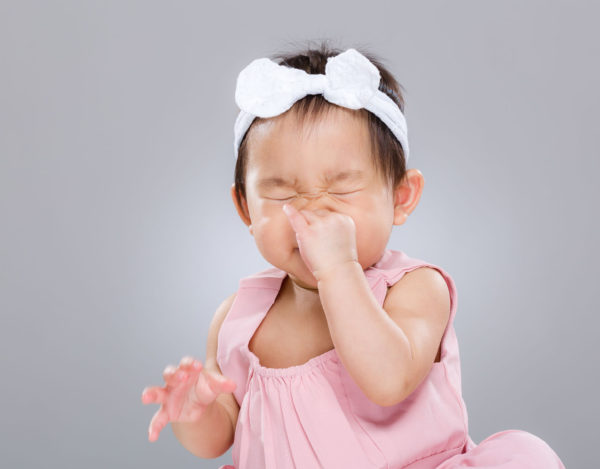Along with colds, RSV and ear infections aren’t the only problems that can affect your baby’s upper respiratory system. Other maladies can also affect his or her ears, nose and throat. Among them are nasal allergies, mastoiditis and nasal inflammation which we’ll discuss in this chapter.
Nasal Allergies

Your baby’s stuffy nose, runny eyes and sneezing may not be due to a cold. Your baby may actually have an allergy to something in the environment. Doctors call the condition allergic rhinitis, and it’s caused when your baby’s immunoglobulin reacts to allergens in the air.
In laymen’s terms, something in the air irritates your baby’s nasal passages prompting the body to make more antibodies. These antibodies cause swelling and inflammation in your baby’s nasal passages.
Nasal allergies themselves aren’t a serious condition, but they can be aggravating and can lead to other problems if not controlled. For example, excess mucus and inflammation in the nasal passages can block the ears’ Eustachian Tubes, causing an infection.
Babies with allergies may also find it difficult to breathe through their noses, and when babies can’t breathe well, they don’t sleep well. Not only can it lead to a cranky baby, but prolonged mouth breathing can cause the teeth and facial bones to develop incorrectly. Additionally, babies with allergies have a harder time fighting off germs that cause colds and respiratory infections.
Allergies in Babies
Even very young children can have allergies to an environmental source. In fact, up to 40 percent of children can have nasal allergies which can start around six months of age. However, a baby’s allergies are not usually caused by pollen, grass or other outdoor allergens. That’s because babies under two typically don’t spend enough time outdoors to develop an allergy. To become “allergic” to a source, humans must be exposed to the multiple times to trigger an immune response
Rather, something in your home is usually the reason babies have nasal allergies. The common culprits are
- Cigarette smoke,
- Dust mites,
- Mold,
- Perfume,
- Cockroaches.
What are Symptoms of Nasal Allergies?
The symptoms of allergies in babies are similar to those of a cold. However, babies with nasal allergies don’t run fevers as they might with a cold. Symptoms can include:
- Nasal stuffiness,
- Thin watery nasal discharge,
- A runny nose,
- Watery, irritated eyes,
- A slight cough,
- Sneezing.
As a result of environmental triggers like perfumes and scents in detergents and soaps, some babies might experience eczema, a skin condition that causes red, scaly patches on his or her cheeks, scalp, arms, legs, neck or forehead.
It usually gets better as babies get older and there are many at-home remedies and ointments that can help.
Should I Take My Child to A Doctor?
If you think your child is suffering from allergies, first try to identify the source. For example, if your baby starts sneezing every time he or she visits a home with a pet, then pet fur may be to blame. However, it’s not always as easy to identify the problem. In these cases, try to reduce environmental triggers that could potentially cause an allergic reaction in your baby.
Here are some things you can do to prevent allergies at home:
- Wipe down blinds weekly,
- Wash bed linens and stuffed animals in hot water,
- Use a mattress cover to keep dust mites away from baby,
- Clean regularly underneath refrigerators and anywhere mold can grow,
- Change your shower curtain liners regularly,
- Keep pets out of baby’s room and places baby spends time,
- Vacuum regularly to remove dust mites, ideally using a vacuum with a HEPA filter,
- Don’t use wet cleaners on carpets and upholstery as they allow mold growth,
- If you live in a humid climate, reduce moisture in your home using a dehumidifier,
- Wipe down kitchen counters, take out the garbage and keep food stored in airtight containers to reduce cockroaches,
- Purchase an air purifier with a HEPA filter to reduce airborne allergens.
If these tactics don’t work, your baby could have an allergy to a food that’s causing his or her nasal allergies. If you can’t identify the problem on your own, your pediatrician, an allergist or an ENT (otolaryngologist) can likely recommend a different course of action.
Is My Baby at Risk for Allergies?
Allergies of any kind are more likely to occur in children whose close family members also have allergies. However, if you are allergic to pet hair, it doesn’t necessarily mean your child will be too. But the chances are higher for your child to be allergic to some type of environmental trigger. The opposite is also true. If you don’t have allergies, your child can still develop them at any time.
